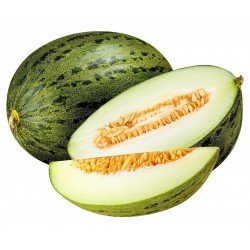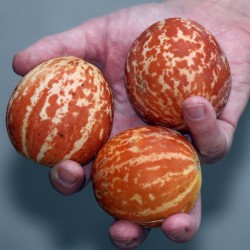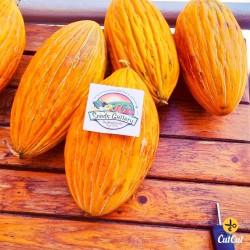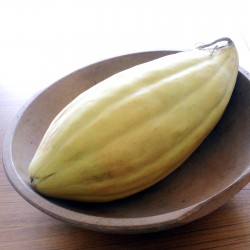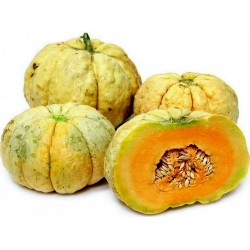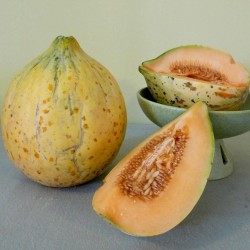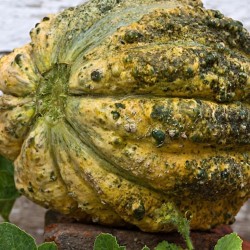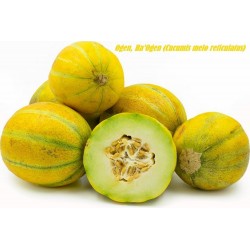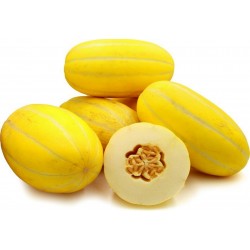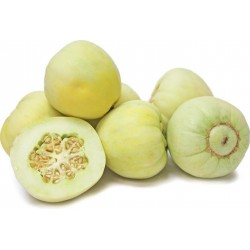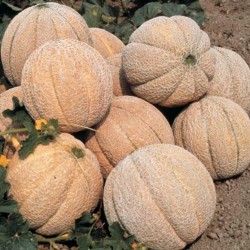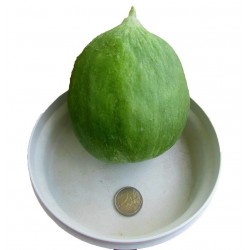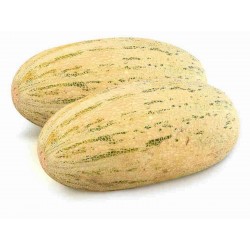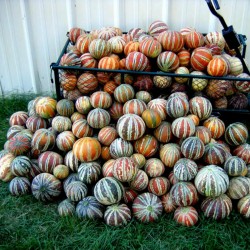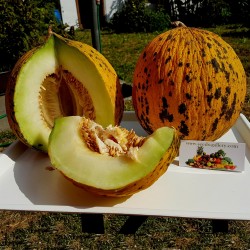Seeds Gallery EU,
5/
5
<meta http-equiv="Content-Type" content="text/html; charset=UTF-8" />
<h2><strong>Ogen, Ha'Ogen, Desert melon Seeds (Cucumis melo reticulatus)</strong></h2>
<h2><span style="color: #ff0000;"><strong>Price for Package of 5 seeds.</strong></span></h2>
<p><span>The Ogen melon is almost perfectly spherical with gently grooved sutures that run end to end. They are small to medium in size, averaging 15 centimeters in diameter. They have a golden beige netted exterior with lime green longitudinal grooves running from stem to blossom end. When ripe, the pale green flesh is succulent and sticky sweet with intoxicating aromatics of tropical fruit and flower nectar. The flesh bears a pulpy, easily removed central seed cavity.</span></p>
<p><strong><span>Seasons/Availability</span></strong></p>
<p><span>Ogen melons are available during the summer season.</span></p>
<p><strong><span>Current Facts</span></strong></p>
<p><span>The Ogen melon is a member of the Cucurbitaceae family, along with cucumbers, gourds, squashes, and pumpkins. The Ogen melon is a true muskmelon variety and an open-pollinated heirloom melon botanically known as Cucumis melo reticulatus. There are several cultivars of melons that all fall into the variety name, Ogen, aka Ha'Ogen and Desert melon. Another common name for the Ogen melon is Israel cantaloupe, citing its origins.</span></p>
<p><strong><span>Nutritional Value</span></strong></p>
<p><span>Ogen melons are high in vitamin C, vitamin A, carotenoids, bioflavonoids, potassium, calcium, iron, dietary fiber and pectin.</span></p>
<p><strong><span>Applications</span></strong></p>
<p><span>The Ogen melon is a versatile summer fruit. It can be eaten fresh out of hand, added to salads both savory and sweet, used in fruit ices and sorbets and blended into frozen cocktails. Complimentary pairings include figs, stone fruit, pancetta and proscuitto, goat cheese, ricotta and feta, hazelnuts, pistachios, arugula, basil, cilantro, vanilla, prawns, scallops, tomatoes, citrus and chiles. Select your melon carefully, looking for a specimen which feels heavy for its size and resounds with a rich hollow sound when tapped. Ogen melons will keep at room temperature for three to five days once fully ripe. Cut melon will keep in the refrigerator wrapped in plastic and is best consumed within three days.</span></p>
<p><strong><span>Ethnic/Cultural Info</span></strong></p>
<p><span>In Isreal, the Ogen melon is also known as Ha'Ogen named after the kibbutz in Israel where it was popularised over 50 years ago. A kibbutz, Hebrew for "gathering" or "clustering", is a collective community in Israel, traditionally based on agriculture.</span></p>
<p><strong><span>Geography/History</span></strong></p>
<p><span>The Ogen melon is native to Israel, where it was cultivated and popularized in a kibbutz in the early 1960's. Bearing this particular kibuttzs' name, the Ogen melon soon spread throughout the area developing a reputation for its intoxicating sweet aroma and flavor. It is no wonder that the Ogen has melon has been awarded the Royal Horticultural Society's Award of Garden Merit. A distinction based on availability, excellence in quality and flavor, and reasonable resistance to pests and disease. Ogen melons yield best harvests in warm Mediterranean regions during hot dry summer months.</span></p>
<p><strong><span>Recipe Ideas</span></strong></p>
<p><span>Recipes that include Ogen Melon. One is easiest, three is harder.</span></p>
<p><span>Two Peas and Their Pod Melon Salad with Mint, Lime, and Sea Salt</span></p>
<p><span>Amelia Saltsman / Food Melon and Cucumber Salad with Mint</span></p>
<p><span> </span></p>
V 229 (5 S)

